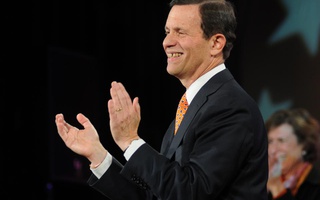The former heads of the Republican and Democratic Parties sparred yesterday at a debate at the Institute of Politics (IOP).
Haley Barbour, who oversaw the "Republican Revolution" in 1994, and Steve Grossman, who helped in the first re-election of a Democratic president in 52 years, were part of the study group led by IOP Fellow David Pryor, a former U.S. senator and governor of Arkansas.
The debate, entitled "How the Republican and Democratic Parties see the Elections of 2000," included issues such as the economy, Kosovo and hate crimes.
"The 2000 elections are very important. The stakes are very high," Barbour said.
Barbour said that presidential, congressional and state elections were likely all to be closely contested in 2000. As a result, he said it might be possible for one party to sweep to power in all three arenas.
And, since three or four Supreme Court judges could be retiring during the first four years after 2000, this presidency has acquired additional long-term significance.
Grossman agreed, adding that division within the Republican Party would help the Democrats.
"All the marbles are on the table," Grossman said. "And there is an ideological food fight for the soul of the Republican Party. I feel good--not overconfident, but good--about our chances in 2000."
The elections should focus on the economy and taxes, Barbour said, because these issues are often the bread and butter of campaign politics.
"Did we spend 30 years balancing the budget to let the government spend it immediately?" he said.
Grossman agreed that the economy should be an important issue, but also said that President Clinton was responsible for tax reform and that Democrats had shed the image of "tax-and-spend liberals."
"It is the Democratic Party that has been thoughtful and fiscally responsible in tax reform," Grossman said.
He cited the Earned Income Tax Credit, the lifetime learning credit and other tax cuts as evidence of Democrats' concern for "real economic progress."
Barbour disagreed, blaming Clinton for what he saw as a tax problem in the country.
"Since Clinton has come into power, the [Gross Domestic Product] has increased 16 percent, personal income had increased 17 percent and the personal income tax has increased 43 percent," he said.
Read more in News
BGLTSA Elects Next Year's OfficersRecommended Articles
-
RNC, DNC Square Off In Law School DebateThe Hatfields and McCoys of American politics were civil yesterday afternoon as the chairs of the Democratic and Republican National
-
Barbour vs DoddHaley Barbour and Sen. Christopher J. Dodd (D-Conn.) clashed before a mainly partisan audience at the Kennedy School of Government's
-
Grossman Urges Young Democrats to ParticipateSteve Grossman, a former chair of the Democratic National Committee (DNC) and a possible candidate for Massachusetts governor in 2002,
-
Clinton Urges Democratic UnityBOSTON--President Bill Clinton urged his Democratic supporters to fight the past and regain control of the House of Representatives in
-
Hub Uses Harvard, Glitz to Entice 2000 Dem. ConventionIt's not too often that politicians wine and dine other politicians and then brag about it in press releases and
-
 Coakley and Grossman Lead Democratic Candidates for Governor
Coakley and Grossman Lead Democratic Candidates for Governor













